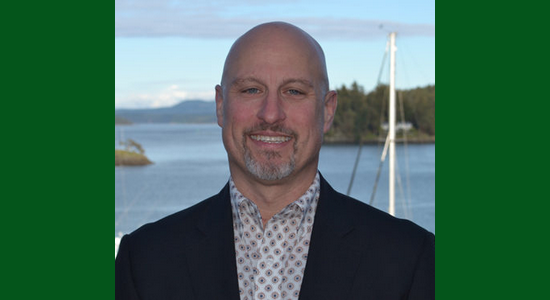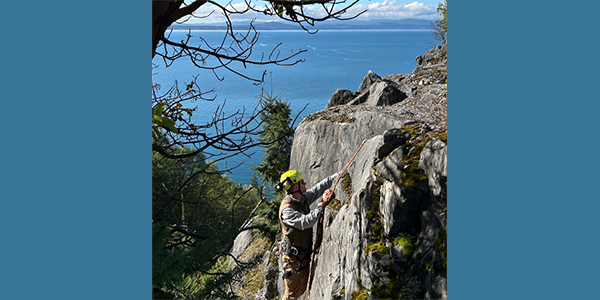||| FROM BRAD BROWN |||
Here is the word on the street – and in the labs – regarding where to shelter from climate disruption.
From Ben Strauss, a vice president of Climate Central, the preeminent global analysis and communication bureau for such disruptions:
“The answer is the Pacific Northwest, and probably especially west of the Cascades.
“Actually, the strip of coastal land running from Canada down to the Bay Area is probably the best.
“You see a lot less extreme heat; it’s the one place in the West where there’s no real expectation of major water stress, and while sea level will rise there as everywhere, the land rises steeply out of the ocean, so it’s a relatively small factor.”
Be, then, ready for climate refugees.
So, what are we going to do about the expected population increase here in the San Juans?
Washington State Governor Jay Inslee was undoubtedly the 2020 presidential candidate with the most serious, detailed position on the environment. In June he released his Global Climate Mobilization action plan in response to the global climate crisis.
That report states, that “due to climate change and other factors, the world faces a global crisis of displacement unlike any since World War II. An estimated 68.5 million people have been displaced worldwide, including nearly 30 million refugees and asylum seekers. This instability is also further fueling an ascendant global right-wing nationalist movement that is pushing nations toward inhumane and unjust treatment of vulnerable populations — building walls between nations rather than partnerships within the global community.”
This statement was presented under the section title, “Fulfilling America’s Obligation to Protect Displaced Communities & Asylum Seekers.”
Northwest meteorologist/hero, Cliff Mass, agrees: “A compelling case can be made that the Pacific Northwest will be one of the best places to live as the earth warms. A potential climate refuge.”
A 2015 Washington State University study by graduate student Alison Saperstein describes the likely scenarios of PNW migration in a changing climate. That study notes that climate change is probably “unlikely to create a sudden or dramatic population spike in the next few decades.” Saperstein admits, though, that counter to common belief, the “‘trapped populations’ that have neither the resources nor social connections to move” may not stay where they are. It is expected that those with wealth would stay in otherwise difficult climate situations because they have financial ties to those areas and because they can afford accommodations like air conditioners, strengthened housing, and price-induced water rationing.
This may mean that those with little will attempt to move on to better situations.
But, as Saperstein says, “public policies could have a big influence on who ends up where.”
This gets us to the question of how open and welcoming we in the San Juans are to climate refugees – or even Syrian refugees or Afghan refugees.
If this recent rabid anti-tourist sentiment continues, is it far-fetched to see resistance to accepting those who want to refuge here in the San Juans? That those opposing more people on the islands would attempt to have government limit the number of refugees?
All we have to do is look at county opposition to vacation renters. This is an ethical antithesis to who humans are. We need to consider our intentions and our actions in relation to the most needy.
Let us be welcoming to our island. Let us not put fear and hatred out in front of who we are.
**If you are reading theOrcasonian for free, thank your fellow islanders. If you would like to support theOrcasonian CLICK HERE to set your modestly-priced, voluntary subscription. Otherwise, no worries; we’re happy to share with you.**









All here are seeking refuge from something / many things. The points raised in the article are spot on with the emergent trend to work from home catalyzing more affluent refugees.
Some things to ponder
Hey Brad
I have 20 Hungarian relatives coming for Thanksgiving. Can we use your house??
Sure.
There will be lots of places to stay in short term rentals. The local merchants will be pleased. Crime and hard drug use will go down. Water will be readily available.
“Not.”
Between the long ferry ride and lack of housing, climate refugees will not stay long.
Unless, we have serious housing remedies, which are needed. Our community needs more housing for workers, which we are short of.
If they come, we need to house them.
Our aging community needs young people. The Covid debacle surely complicates things.
But we are destined to be a grumpy, aged community that reflects on the past if we do not look towards an equitable future.
Brad Brown,
You are confusing/conflating at lot of issues here:
“If this recent rabid anti-tourist sentiment continues, is it far-fetched to see resistance to accepting those who want to refuge here in the San Juans? That those opposing more people on the islands would attempt to have government limit the number of refugees?
All we have to do is look at county opposition to vacation renters. This is an ethical antithesis to who humans are. We need to consider our intentions and our actions in relation to the most needy.
Let us be welcoming to our island. Let us not put fear and hatred out in front of who we are.”
Question #1: Are vacation renters “the most needy”?
Question #2: What do affluent Climate Refugees have to do with Syrian refugees or Afghan refugees?
About me:
#1 I am not anti-tourist.
#2 I am not anti refugee.
#3 I do think we need to plan to reduce the impacts of a growing population; no matter how good our intentions, there are limits to resources such as water and ferry service.